1UP Scheme
Summary
Staffordshire University’s TIGA award-winning 1UP initiative is a summer placement scheme that provides students with the opportunity to develop commercialised games within the university’s in-house Bulldog Studios.
In Summer 2023, I was recruited to be the Lead Producer on two commercialised projects:
MechHead, a fast-paced arena shooter, which pays homage to the genre’s classics.
Mental Block, a top-down cosy puzzler, inspired by Sokoban.
Both titles were successful at the TIGA Games Industry Awards 2023, where MechHead won Best Arcade Game and Mental Block was nominated for Best Puzzle Game.
Additionally, plans are in motion for the two titles to ship as early as the end of 2023.
Read on below about how I applied my production skillset and the impact I had on both projects within my role of Lead Producer.
Trailer
PLATFORM
TEAM
DURATION
Arena Shooter
Puzzler
GENRE
ENGINE
Unreal Engine
PC
30+
6 Weeks
Projects
MechHead
Best Arcade Game Winner
Mental Block
Best Puzzle Game Finalist
Impact
Instilled an Agile production workflow for both games - encouraging the teams to be adaptive in the face of changing circumstances and stakeholder demands / feedback.
Scheduled production milestones in collaboration with the Project Leads, such as deadlines for Planning, Pre-Production, Vertical Slice, Production, QA, Polish, and Publishing Assets.
Coordinated weekly sprints to ascertain the team’s capabilities and output within a set period of time, which could then be used to determine the workload of subsequent sprints.
Established the agendas of weekly team meetings (addressing sprint goals) and sprint retrospectives to ensure that all important points pertaining to these meetings were discussed.
Facilitated communication between interdisciplinary Leads through holding daily Scrum stand-ups, which covered team progress, current impediments, and daily / weekly goals.
Maintained concise and comprehensive notes for all meetings, stand-ups, and retrospectives to ensure that audit trails were in place for future cycles of the 1UP scheme to refer back to.
Championed a people-first approach to development by safeguarding the team’s well-being and organising socials, while acting as the link between developers and project stakeholders.
Supported the Project Lead by alerting them to identified risks and subsequently worked together to mitigate them.
Organised assets and resources by introducing file structures and naming conventions on Microsoft Teams, and encouraged the Tech Leads to follow the same processes on GitHub.
Delegated ownership of features to strike teams, such as Audio, UI, and VFX, which defined the responsibilities of developers and provided clarity with respect to target deliverables.
Advised multidisciplinary Leads to share best workflow practices with the juniors, such as Blender for the Art team, Photoshop for the Design team, and Unreal Engine 5 for the Tech team.
Assigned tasks on a proactive basis following team meetings and stand-ups, and encouraged developers to update their tasks in accordance with their progress.
Advocated for the transfer of people and resources between games where necessary to ensure both projects were on track, and occasionally advocated for new staff to be onboarded.
Managed the QA process by collaborating with Project Leadership to create testing documentation and questionnaire forms, both of which provided valuable data for design iteration.

MechHead - Meeting Notes
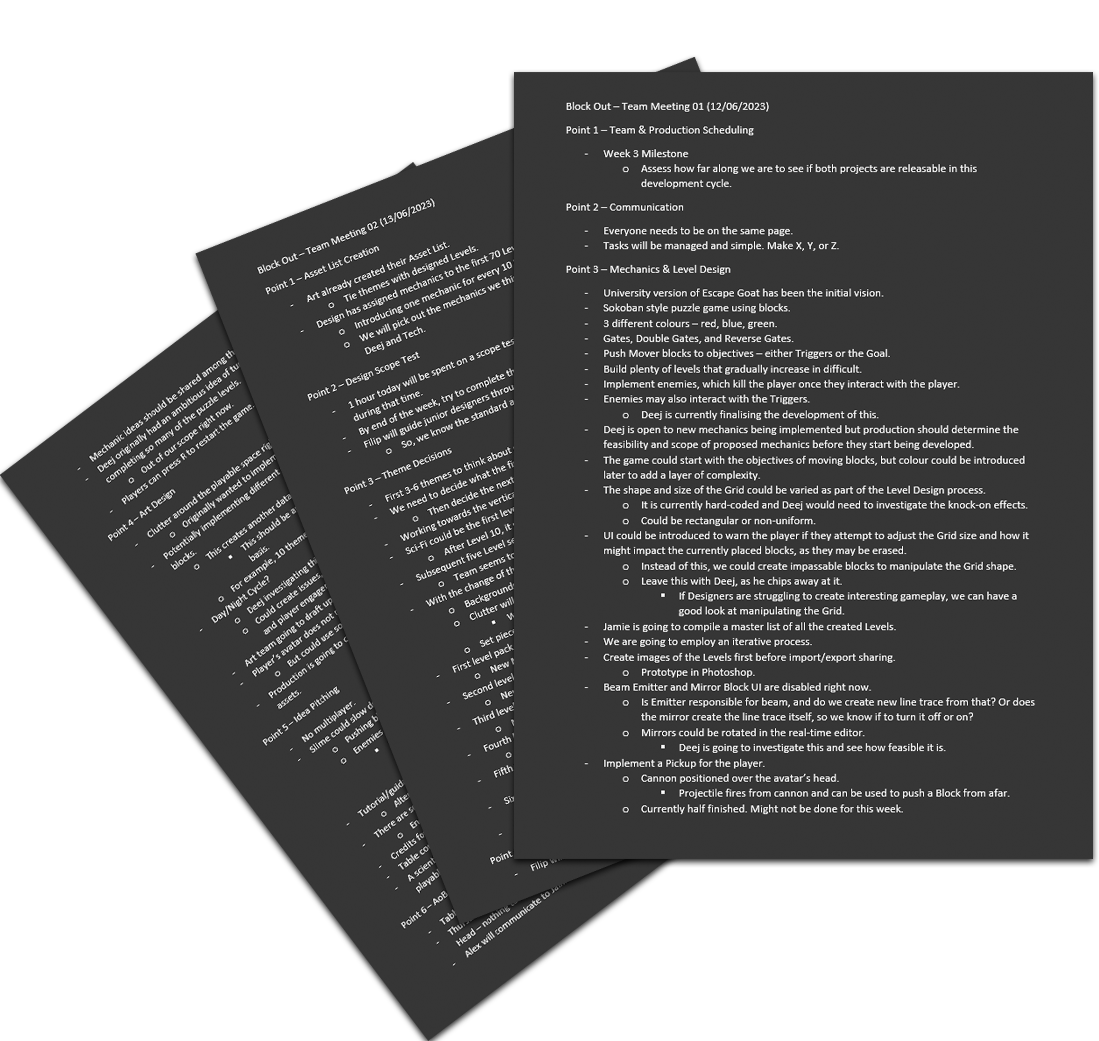
Mental Block - Meeting Notes
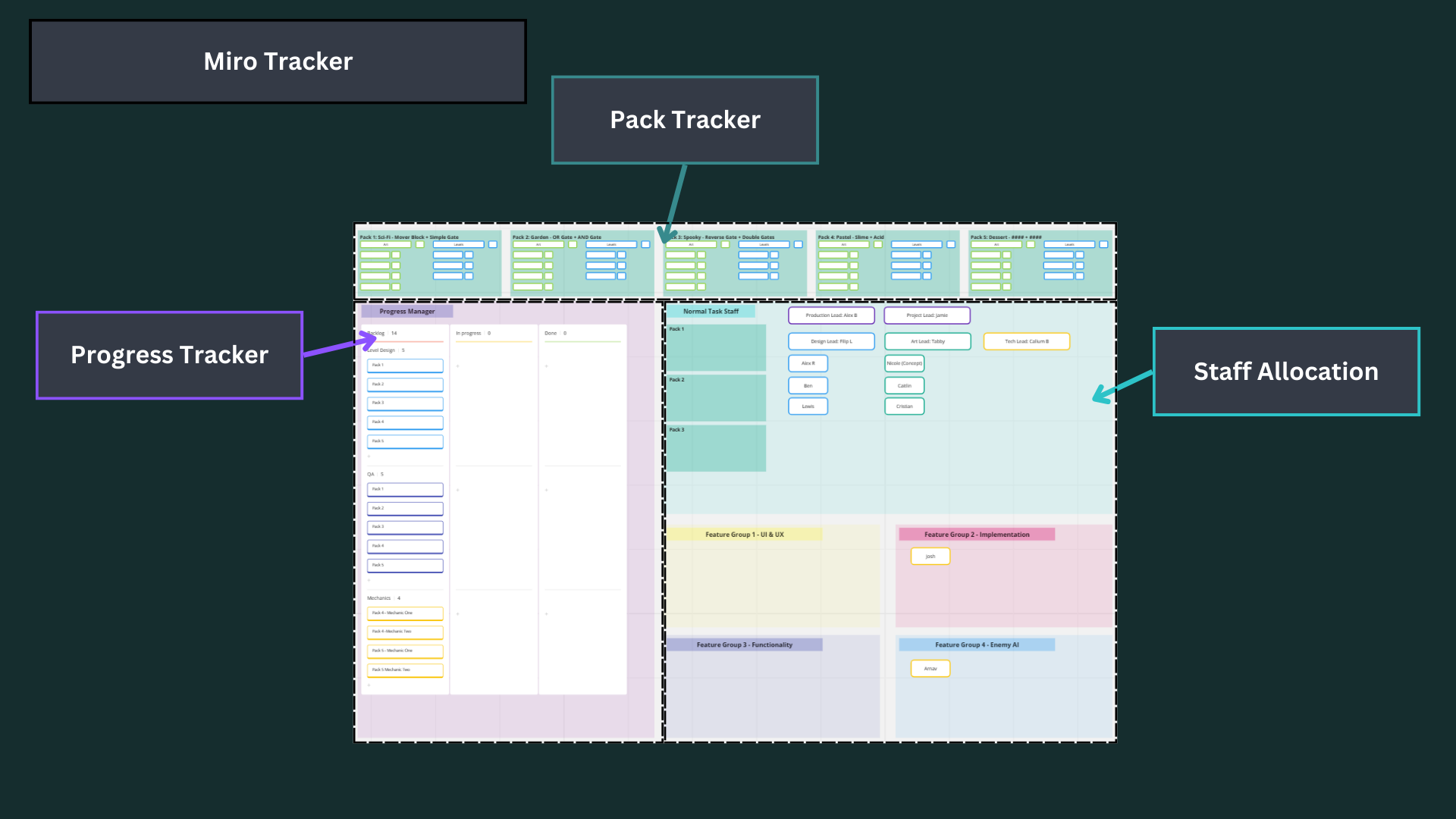
Mental Block - Miro Tracker Guide
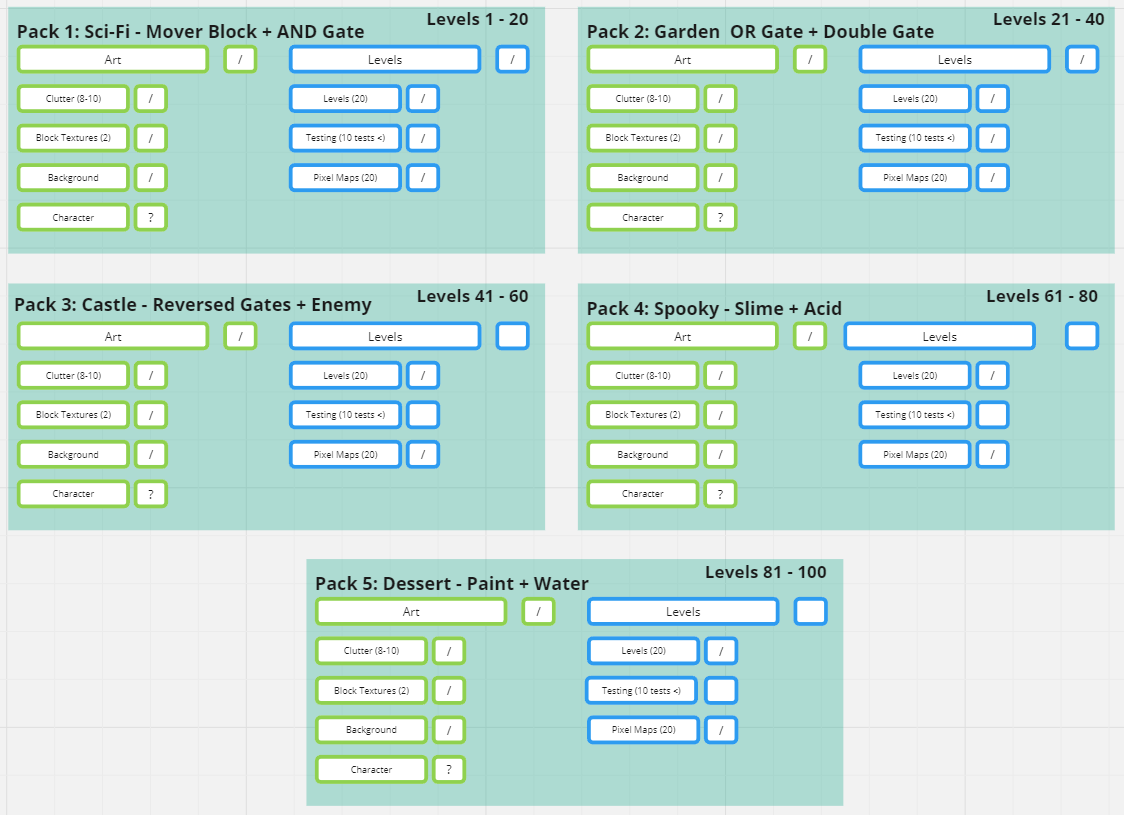
Mental Block - Pack Tracker
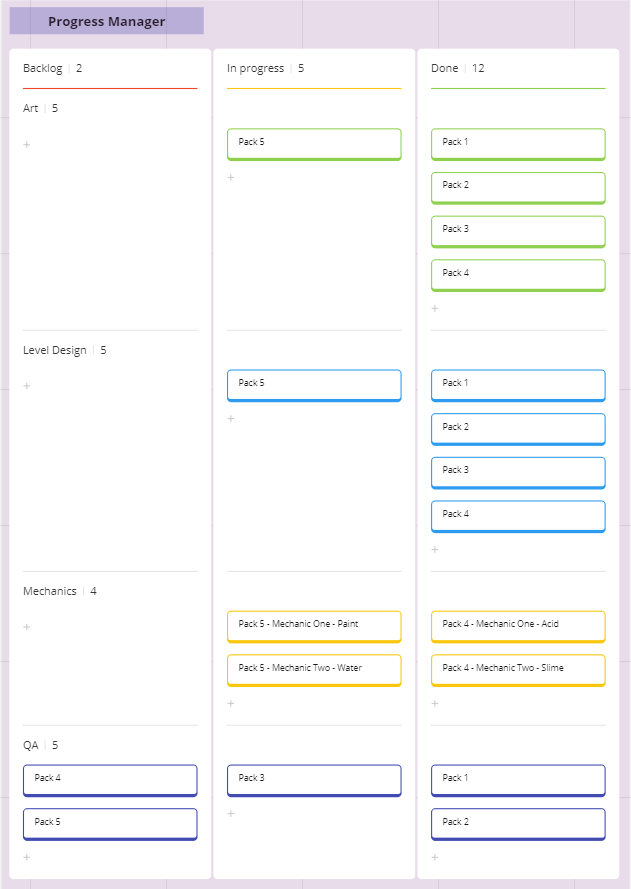
Mental Block - Project Progress Tracker

Mental Block - Strike Teams
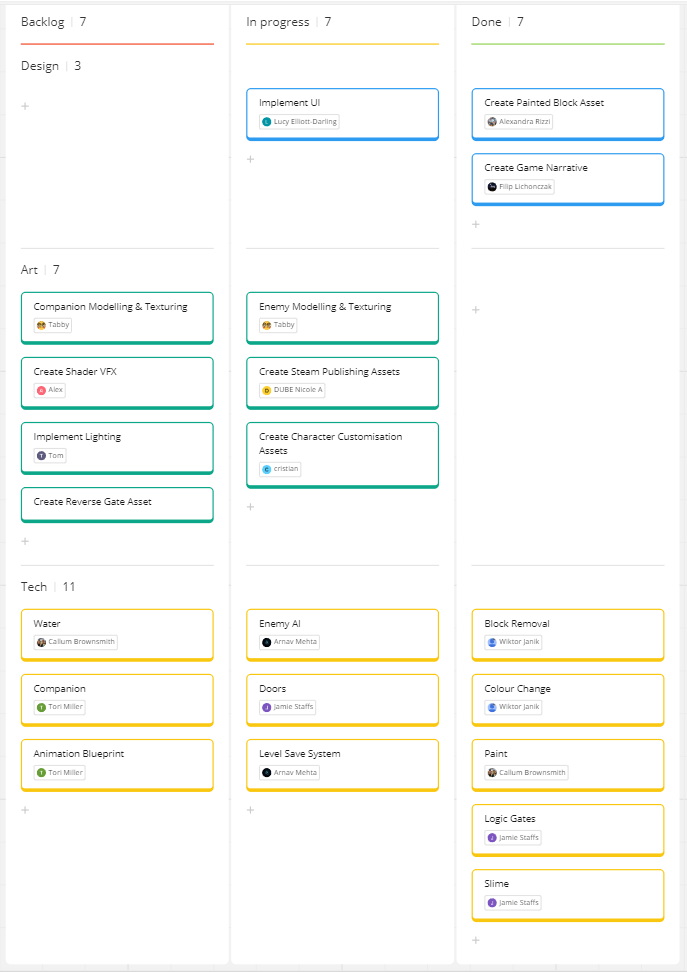
Mental Block - Task Tracker
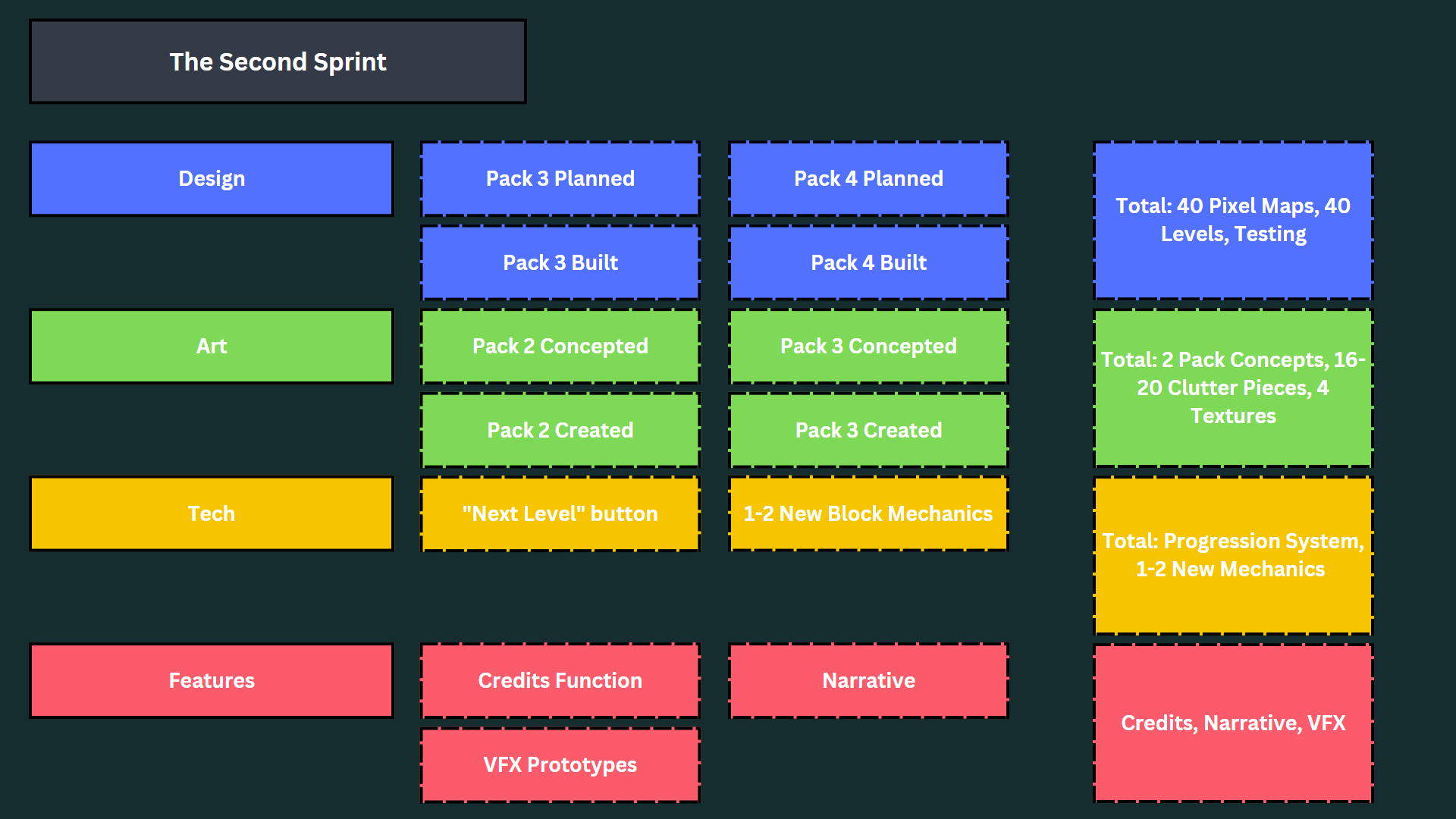
Mental Block - Sprint Goals (2 of 6)
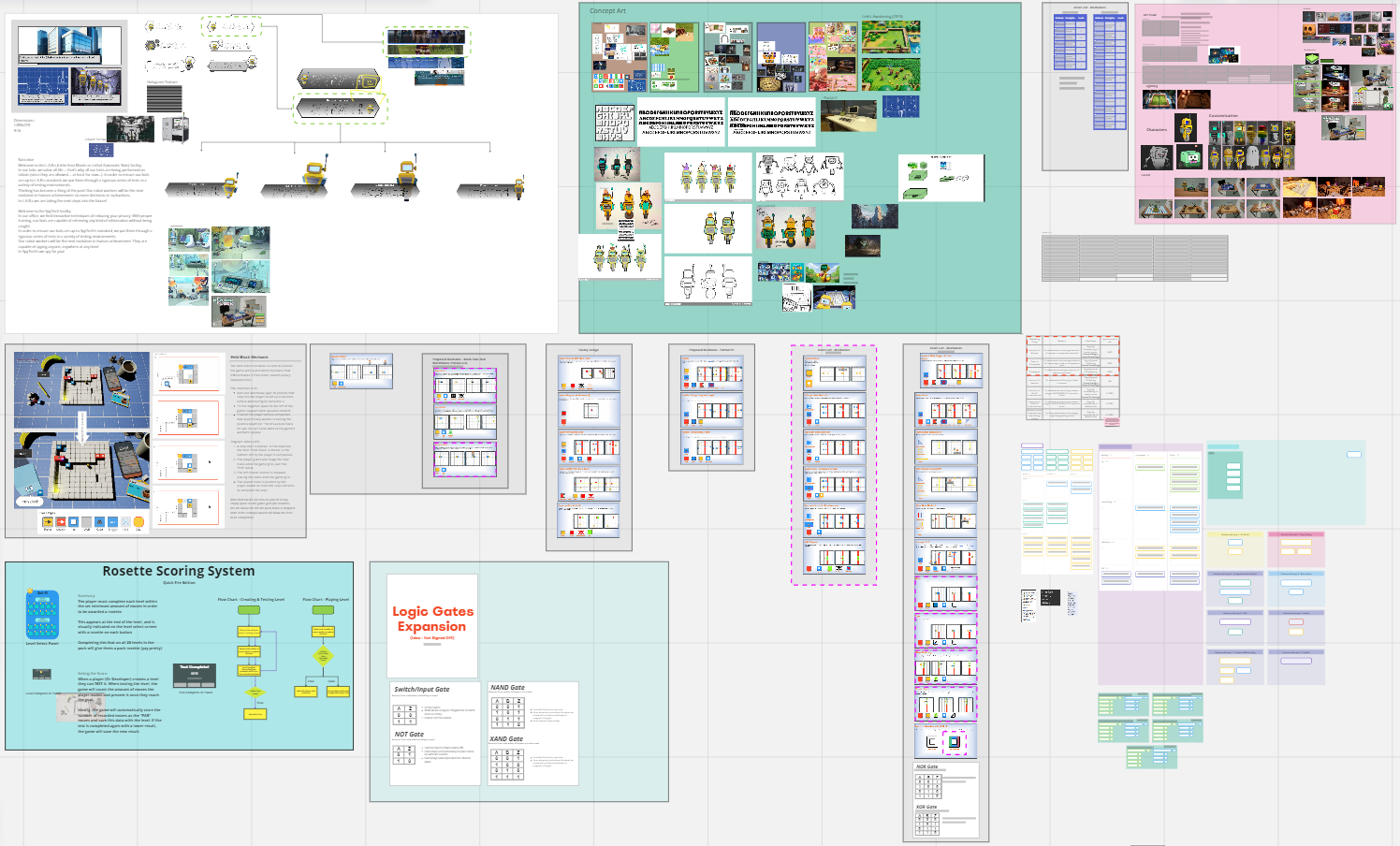
Mental Block - Miro Planning Board
Post-Mortem
What did not go well?
Insufficient R&D at the beginning of the project, as issues with Mental Block’s demo version (originally used as a teaching tool by lecturers) were revealed later in the project and required the game’s code to be rewritten.
Occasionally, developers would begin planning features and systems, unbeknown to others on the team, which could have benefitted from recentring the game direction.
In the case of foreseeable absences, there was a lack of sufficient handover, which led to some confusion over intended designs and impeded progress.
Not enough value was placed on asset lists in this instance, so some assets were overlooked during development, which led to delays in their implementation.
Some aspects were not considered until a lot later in development, such as Lighting, Narrative, and UI, due to the lack of specialised developers in these areas.
As a result of changing circumstances, QA kept getting pushed back from the midway point to the final week.
Version control was a challenge, as changes to Blueprint were not immediately obvious in GitHub, so merging builds with undocumented changes caused conflicts.
What went well?
The team were successful in delivering two TIGA Award nominated games within a strict 6-week timeframe.
Morale remained very high throughout and the team bonded early through shared breaks and social events.
Scope was locked in early - within the first week.
Early sprints helped us to calculate our weekly output, and this was successfully scaled to meet the deadline.
We kept agile and adapted to changing circumstances, such as tech impediments, team member absences, and stakeholder feedback.
Production bridged the multidisciplinary jargon barrier between members of the team.
Getting to know the team on an individual basis allowed production to assemble strike teams that leaned into each person’s strengths while providing space to grow.
Successfully pitched and secured extra resources where necessary, such as 3D Artists that specialise in Blender.
In accordance with free software licenses, the team had the drive to push themselves and learn unfamiliar tools.
Stakeholders were happy with the team’s deliverables.
What did we learn?
Early planning should take place between Leads and Concept Artists to lock in art styles and core designs early before other developers commence their work.
Competitor analysis should also begin in the early planning stage to establish our USP as soon as possible.
Teams that lack developers with certain specialisms mean that those areas can become overlooked (such as an initial lack of ownership in relation to Lighting), so these aspects should be considered and planned from the start.
Pipelines and file structures can begin slipping as deadlines approach, which is when developers shift more of their focus to output rather than organisation.
Crucially, in a work week where developers can choose their days, ensure that there is still enough representation from each discipline on any given day to avoid setbacks.
Leads should be aligned on prioritising playtest builds, in order to prove designs and identify any issues with the game sooner rather than later through risk mitigation.
Effective communication is essential when it comes to changes that developers are pushing to GitHub, so that progress is not lost as a result of conflicting changes.
Software
Team
Bulldog Studios
-
Alex Briggs - Lead Producer
Alex Konosonoks - VFX Artist
Alex Mckie - Level / UI Designer
Alexandra Rizzi - Game Designer
Arnav Mehta - Lead Tools Engineer
Ben Gibbons - Game Designer
Caitlin Fawcett - QA Tester
Callum Brownsmith - UI Developer
Callum Roberts - Lead Artist
Charlie Radage-Revell - Technical Developer
Chris Williams - Additional Music
Cristian Cuciuc - QA Tester
Dan Bond - Project Lead
David James - Original Concept
Davin Ward - Lecturer & Technical Consultant
Filip Lichonczak - Game Designer
Hollie Tyler - Level Designer
Jamie Nicholas - Lecturer & Design Consultant
Jamie Tranter - Lecturer & Technical Consultant
Jennifer Martin - 3D Artist
Jingtao Gao - Environment Artist
Jonah Kirtley - Environment Artist
Joshua Crabb - UI Developer
Lewis Powell - Lead Game & Tools Programmer
Lucy Elliott-Darling - Game Designer
Mathew Dalgleish - Audio Director
Molly Swift - Art Director
Nick Anna - QA Tester
Olivia Cross - Lead Level Designer
Sam Dyson - Technical Developer
Savannah Wesley - Concept Artist
Sebastian White - Game Developer
Tabby Seed - QA Tester
Tom Bloomfield - 3D Artist
Tori Miller - Technical Designer
Tyler Timlin - Lead Designer
Wiktor Janik - AI Developer
-
Alex Briggs - Lead Producer
Alex Konosonoks - VFX Artist
Alex Mckie - QA Tester
Alexandra Rizzi - Designer
Arnav Mehta - Lead Systems & Tools Engineer
Ben Gibbons - Designer
Caitlin Fawcett - 3D / Texture Artist
Callum Brownsmith - Lead Gameplay Developer
Callum Roberts - QA Tester
Charlie Radage-Revell - QA Tester
Chris Williams - Additional Music
Cristian Cuciuc - Prop Artist
Dan Bond - Lecturer & Design Consultant
David James - Original Concept
Davin Ward - Lecturer & Technical Consultant
Filip Lichonczak - Lead Designer
Hollie Tyler - QA Tester
Jamie Nicholas - Project Lead
Jamie Tranter - Lecturer & Technical Consultant
Jennifer Martin - QA Tester
Jingtao Gao - QA Tester
Jonah Kirtley - QA Tester
Joshua Crabb - Technical Developer
Lewis Powell - QA Tester
Lucy Elliott-Darling - Designer
Mathew Dalgleish - Audio Director
Molly Swift - Art Director
Nick Anna - Concept Artist
Olivia Cross - QA Tester
Sam Dyson - QA Tester
Savannah Wesley - QA Tester
Sebastian White - Game Developer
Tabby Seed - Lead Artist
Tom Bloomfield - 3D Artist
Tori Miller - Design / Technical Developer
Tyler Timlin - Lecturer & Design Consultant
Wiktor Janik - Technical Developer















